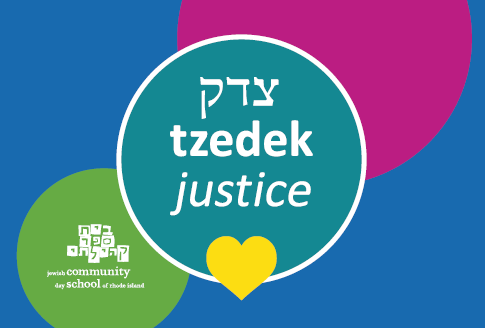Tzedek, tzedek tirdof / צֶ֥דֶק צֶ֖דֶק תִּרְדֹּ֑ף — Justice, justice thou shalt pursue.
As was taught in the name of Rabbi Hiyya, a fourth-century scholar:
“If a person is neither a scholar, nor a teacher, nor known for observing all the ritual commandments, but stands up to protest against evil, such a person is considered a blessing.”
At the Jewish Community Day School of RI, all we do is informed by our 5 core values – chesed (kindness), kavod (respect), achrayut (responsibility), kehillah (community), and tzedek (righteousness & justice). They shape our approach to learning, how we treat ourselves and others, and how we understand what it means to an inclusive and open-minded Jewish community school that is committed to social justice.
In Hebrew, the word tzedek encompasses the way we treat each other and the planet. It requires that we say or do something when we see another being treated unfairly. In Deuteronomy 16:20, We’re told, “Justice, justice thou shalt pursue.” Or as the venerable John Lewis said: “If you see something that is not right, not fair, you have a moral obligation to do something about it.” Our students have long been learning about being “upstanders” and they are now more explicitly connecting speaking up and speaking out to the pursuit of justice. For instance, our 5th grade students connected the dire need for affordable housing in America to the temporary shelters we construct for Sukkot, and wrote a D’var Torah (teaching based on text) urging listeners to contact government officials about this need.
Our commitment to integrating tzedek into our school’s life and learning is reflected in our decision to appoint Erika Rusley, an experienced educator, as our Tzedek/Justice Coordinator (You can learn more about Erika here). Erika is working with our teachers to incorporate Social Justice Standards into our curriculum, providing us with a “roadmap for anti-bias education at every stage of K-12 instruction”(Learning for Justice). The four main areas of study are Identity, Diversity, Justice, and Action and more information about the standards is available here.
Many of the established social-emotional and curricular practices at JCDSRI dovetail with Social Justice Standards; for example, the self-portraits created in our younger grades align beautifully with the Identity Anchor Standards, which focus on positive social identities within a diverse community. Other students in those classes might be practicing restorative conversations with one another to help solve school-based problems, eventually using those skills to address more complex societal problems, such as food and housing insecurity and environmental degradation. Students in our upper grades are meeting with individuals with disabilities, learning about the fight for indigenous sovereignty, and engaged with Black historians about the legacy of the slave trade in Rhode Island. The problems – and the means by which our children learn to solve them are varied – but our goal is always to make the world a better, more just place for all.
Over the past few years, our teachers have engaged in a deep dive into anti-racist work, including how racism has impacted not only our curriculum and pedagogy, but also our personal lives, led by a professor of education and an experienced social worker. Dr. Lesley Bogad, a professor of education at Rhode Island College and a member of our Board of Trustees, and Meghan Cavanaugh, our school social worker, led us in our work. We are proud to announce that we have extended this work to our Board of Trustees. Having received a grant from the Jewish Alliance, this year our Board members – alongside those from Jewish Collaborative Services – will be engaging in anti-racist learning led by the prestigious Jewish social justice organization, Avodah. In addition, educators from the Human Rights Campaign led our faculty and staff in a workshop devoted to creating gender inclusive schools and addressing issues related to LGBTQIA students and families.
Our commitment to tzedek has also been reflected in the hundreds of hours and thousands of dollars we have spent revamping our school and classroom libraries to reflect our more diverse and just understanding of our world. This has included purchasing books that tell the stories of different communities of color (including in the Jewish community), as well as stories of social justice. Working closely with our School Librarian, our Diversity, Equity, Inclusion Parent Group has sponsored an annual DEI Book Fair, encouraging our community to not only purchase books that reflect our values for our school, but also for personal readership! In addition, our Tzedek Coordinator is spearheading an effort to create an affinity group for Jews of Color working in collaboration with the Jews of Color Initiative, as well as with Brown/RISD Hillel.
At JCDSRI, we understand that the building of a just and equitable society is a process, one that requires not only our dedication and sacrifice, but those also beyond our community. Yet, as our tradition reminds us: “You are not required to finish your work, yet neither are you permitted to desist from it” – Pirkei Avot (The Ethics of the Fathers). This serves as a guide to us as we continue to educate the change-makers of the future who we know will take on the work wherever we leave off.
